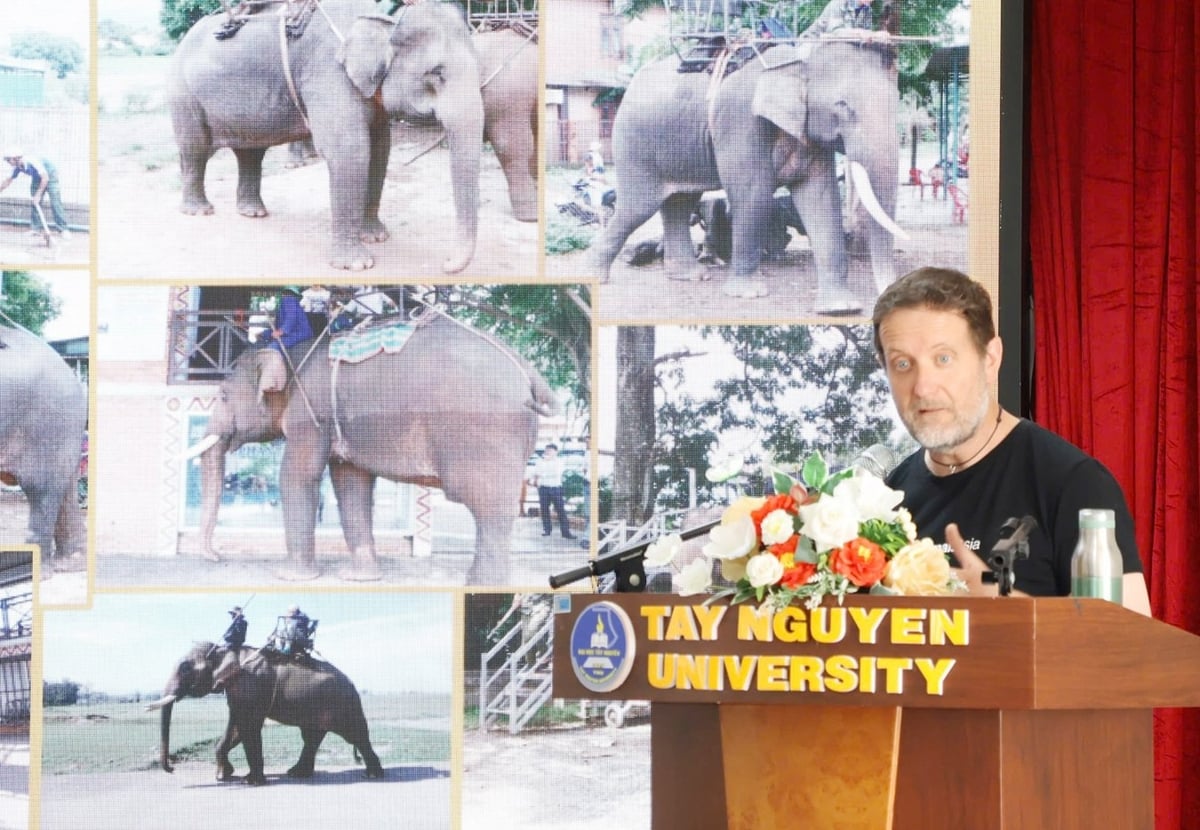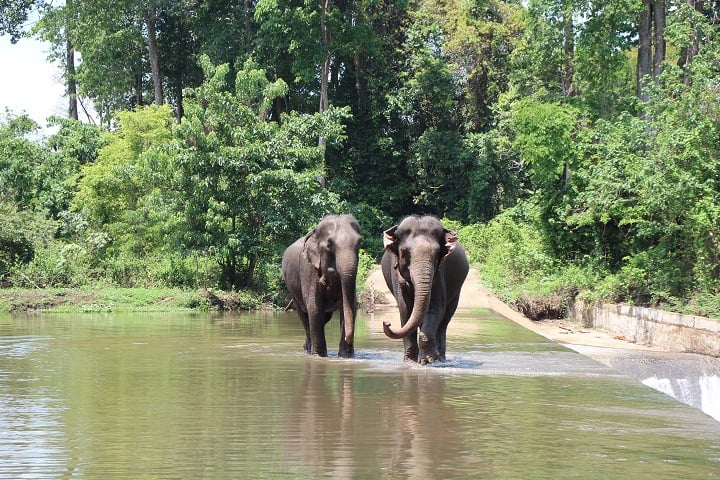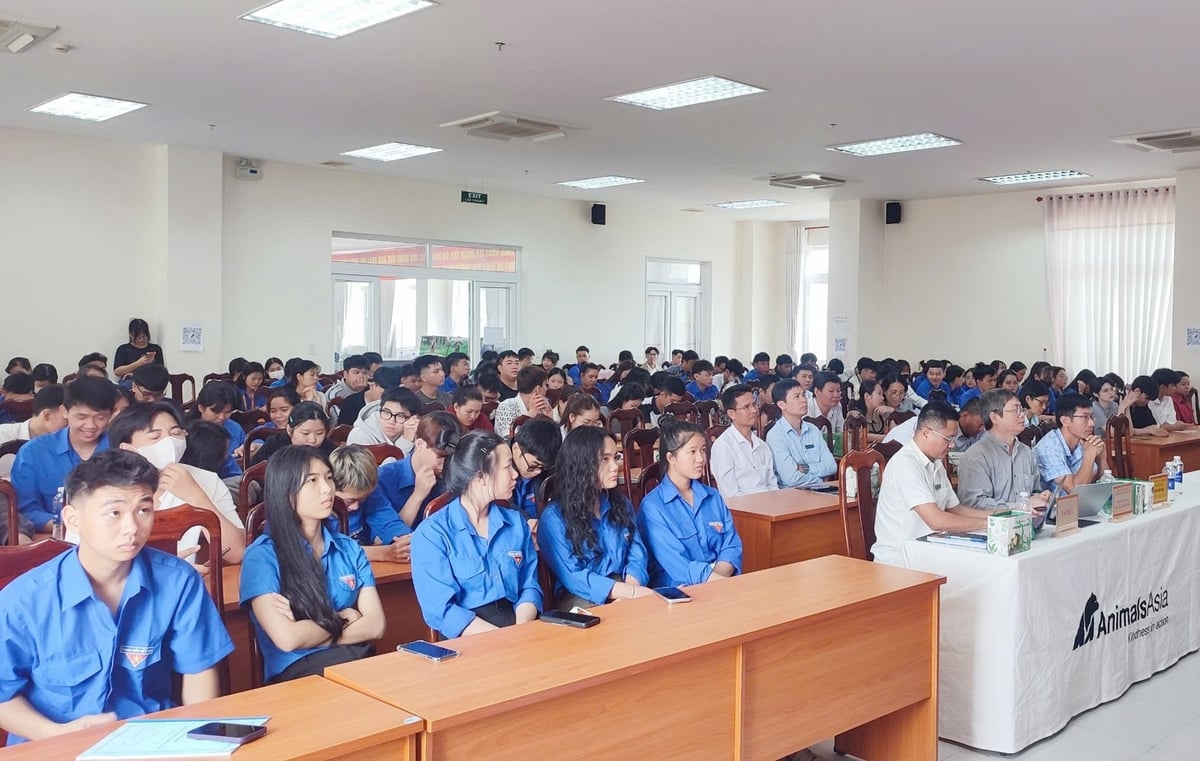December 30, 2025 | 19:18 GMT +7
December 30, 2025 | 19:18 GMT +7
Hotline: 0913.378.918
December 30, 2025 | 19:18 GMT +7
Hotline: 0913.378.918
On May 16, in Dak Lak province, the Animals Asia Foundation (AAF), in collaboration with the Elephant Conservation Center (ECC) and Tay Nguyen University, organized a seminar titled “Animal Welfare in Entertainment Activities - The Story of Captive Elephants.”
The event aimed to raise public awareness, enhance professional exchange, and promote sustainable solutions in elephant conservation efforts, while also contributing to the improvement of wild animal welfare in Vietnam. The seminar was attended by international and local experts, representatives of local authorities, and nearly 200 veterinary lecturers, students, and professionals from related institutions.

Mr. David Neale, Global Animal Sentience and Welfare Director at Animals Asia Foundation (AAF), spoke at the seminar. Photo: Tran Tho.
Assoc. Prof. Dr. Tran Quang Hanh, Deputy Head of the Faculty of Animal Husbandry and Veterinary Medicine at Tay Nguyen University, stated: “Elephants are not only cultural symbols but also sentient beings deserving of respect and protection. It is time we reexamine how humans treat wild animals so that animal welfare becomes more than a concept. It becomes a standard of living. A more compassionate future starts with empathy today.”
At the seminar, Mr. David Neale, Global Animal Sentience and Welfare Director at Animals Asia Foundation, emphasized the importance of improving living conditions and minimizing inappropriate animal use as crucial steps toward the development of sustainable tourism.
Mr. Neale shared: “Our collaboration with Tay Nguyen University and the Elephant Conservation Center has created opportunities to spread essential knowledge about animal perception and welfare to those who directly care for and manage animals. This seminar is an open platform to collectively acknowledge current challenges and promote practical, science-based solutions to improve the living conditions of captive elephants in Vietnam. I am confident that the knowledge shared here will soon be applied in daily work, contributing to better lives for all animals in Vietnam.”
Also at the seminar, Mr. Nguyen Cong Chung, Deputy Director of the Elephant Conservation, Animal Rescue, and Forest Protection Management Center of Dak Lak province, introduced a more elephant-friendly tourism model currently being implemented in the province. This model aims to replace traditional practices such as elephant riding and elephant performances.

As of 2025, Dak Lak is home to 35 domesticated elephants. Photo: Yok Don National Park.
As of 2025, Dak Lak is home to 35 domesticated elephants, experiencing a sharp decline from over 500 individuals recorded in the early 1980s. In an effort to conserve the species and improve the welfare of captive elephants, in 2021, the Dak Lak Provincial People's Committee signed a memorandum of understanding with Animals Asia Foundation to transition toward an elephant-friendly tourism model, one that excludes elephant riding and harmful entertainment practices.
Under the agreement, Animals Asia has pledged to provide over USD 2 million to Dak Lak to support the implementation of the new tourism approach. Since 2016, the organization has contributed approximately USD 350,000 to elephant conservation efforts in the province. To date, the living conditions of 14 out of the 35 domesticated elephants in Dak Lak have been improved. Among them, 11 elephants are now participating in non-riding tourism programs at Yok Don National Park, while 3 are being cared for at the Elephant Conservation Center.
This seminar is part of the 2025 “Animal Welfare Training Program for the Faculty of Animal Husbandry and Veterinary Medicine at Tay Nguyen University and related agencies.” The program, jointly organized by Animals Asia Foundation, the Elephant Conservation Center, and Tay Nguyen University, aims to enhance the professional capacity of around 30 local lecturers and veterinary staff. The training includes theoretical lessons, hands-on practice, and field study trips to Yok Don National Park and the Elephant Conservation Center.

Delegates attending the seminar. Photo: Tran Tho.
The training program is designed to update participants on international standards of animal welfare, introduce practical application methods in animal husbandry and veterinary science, and equip lecturers with modern teaching tools. In addition, the program aims to raise public awareness about animal protection and sustainable development, thereby laying the groundwork for long-term conservation initiatives in the Central Highlands region.
Animals Asia Foundation is an international charity dedicated to animal welfare in Asia since 1998. In Vietnam, the organization focuses on ending bear bile farming, enhancing animal welfare standards, and promoting the transition to elephant-friendly tourism models in Dak Lak province.
Translated by Kieu Chi

(VAN) From extensive shrimp ponds, baskets of don gathered on the mudflats, to boats carrying visitors to watch birds, all livelihoods here depend on clean water, green forests, and the calls of migratory birds.
/2025/12/26/0703-3-204813_117.jpg)
(VAN) Transparency in information and listening to local people have helped address ground clearance bottlenecks and build social consensus, thereby accelerating the progress of the JICA3 irrigation project.
/2025/12/27/0609-3-233846_327.jpg)
(VAN) The JICA3 project is expected to become a 'water shield,' helping control saltwater intrusion, proactively secure water resources, protect livelihoods, and promote sustainable development in coastal areas.
/2025/12/26/5654-3-164509_655.jpg)
(VAN) As Viet Nam makes strong commitments toward achieving net-zero emissions, controlling and reducing methane emissions in livestock production is increasingly becoming a mandatory requirement.

(VAN) 'People, Primates, Plants: Co-managing Biodiversity and Improving Livelihoods in Vietnam' (the PPP Project) is an international initiative implemented in Vietnam by BGCI, CEGORN, and ICRAF/World Agroforestry.

(VAN) Dak Nong established a risk-level zoning map for coffee, built a digital data platform for the sector, and promoted certified production in line with EUDR.
/2025/12/25/2709-1-211551_295.jpg)
(VAN) In response to the U.S. Marine Mammal Protection Act (MMPA), Gia Lai province is implementing many solutions to protect marine mammals and develop sustainable, responsible fisheries.